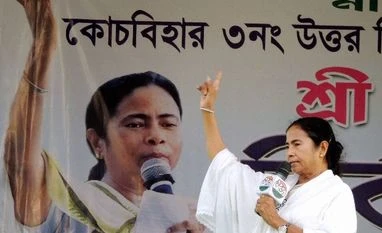Since the Left Democratic Party (LDF) has lived up to the expectation of replacing the Congress-led United Democratic Front (UDF) every alternate year in Kerala, there is nothing unusual about its victory.
The real winner, therefore, in the latest round of elections is the Bharatiya Janata Party (BJP), which has finally achieved its objective of capturing power in Assam, a goal which it had been pursuing since the time of the anti-immigration agitation of the 1980s, for which Arun Shourie (then in the BJP) had set the ball rolling with his vociferous support of the All Assam Students Union (AASU).
Since then, the BJP has been knocking at the door of the Guwahati secretariat with the help of AASU's successor, Asom Gana Parishad (AGP) - the two parties of the Hindu middle class - but was kept at bay by the Congress' Tarun Gogoi who won three successive terms.
The BJP's success this time is based on two factors. One is the anti-incumbency feelings against Gogoi and the other is his, and the Congress high command's, failure to accommodate the ambitious Himanta Biswa Sarma in the party's scheme of things, as a result of which he moved to the BJP.
The post-poll point of interest is whether Sarma will be able to get along with the equally ambitious Sarbananda Sonowal, the BJP's chief ministerial candidate, or whether there will be a repeat of Sarma's earlier fraught relationship of Gogoi with Sonowal as well.
For the present, however, the BJP will be delighted that the nightmare of the electoral setbacks in Delhi and Bihar last year has been offset by the victory in Assam.
Also Read
Even then, its celebrations cannot be wholehearted in view of its failures in Delhi's municipal elections where the Congress has benefitted from the Aam Admi Party's (AAP) setbacks caused by its failure to fulfil its extravagant promises.
Since the Delhi outcome can be seen to provide an inkling of how the electoral winds are blowing for the BJP in the Hindi belt, the party has reasons to be worried about next year's Uttar Pradesh elections which cannot be mitigated by the victory in a distant north-eastern state.
Unlike the Delhi damper in BJP's Assam victory, Chief Minister Mamata Banerjee has shown that poriborton or not, she remains West Bengal's uncrowned queen. Notwithstanding the perceived disillusionment with her highly personalised, authoritarian and cadre-driven governance among the intelligentsia, she has shown that her overall influence remains intact, irrespective of whether or not any development has taken place in the industrial sector.
Arguably, it was too much to expect the Left to erase the memories of its stifling, Stalinist reign of three decades in the company of a palpably sinking Congress.
Like the feudalist, family-oriented party, the Communists will have to resign themselves to spending time in the wilderness in West Bengal for the next five years. Their only solace is the success in Kerala.
For the Congress, however, it is darkness all around except for the faint glimmer in Delhi. At the higher level of state elections, however, the party is in the dumps. It has lost Assam - or threw it away by mishandling the Himanta Biswa Sarma issue - and has failed to recover in West Bengal.
The tales of woe of the 131-year-old formerly Grand Old Party suggest that its present leadership - the mother-and-son duo of Sonia and Rahul Gandhi - are devoid of ideas about how to breathe life into the moribund organisation.
Since a defeat in Uttar Pradesh next year looms before the Congress, its only hope is to perform well in Punjab, but there it may face a tougher fight from the AAP than from the Akali Dal-BJP combine.
For the moment, all that the Congress can do is to lick its wounds, considering that it has gone down with the DMK in Tamil Nadu as well.
Considering the DMK's considerable disadvantages - a 92-year-old leader, his two squabbling sons and the longstanding image of corruption - the party can receive at least one cheer for putting up some kind of a fight against a resourceful opponent.
But the fact that it was able to do so does not speak well of Jayalalitha. It is clear that the waves which fetched her 200-plus seats in the 2011 assembly election and 37 of the 39 parliamentary seats in 2014 have receded.
It is clear that her virtual abdication of authority during last winter's floods in Chennai hurt her, but a credible opponent led by a younger chief ministerial candidate with an appealing image - which rules out M K Stalin - would have given Jayalalitha a run for her money.
It isn't that a nonagenarian cannot be a winner. As the CPI-M's 93-year-old V S Achuthananda has shown in Kerala, it is possible for an ideologically committed warhorse with a clean image to lead his party to victory even if he has been helped by the tainted image of the outgoing Chief Minister Oommen Chandy, who is accused of being involved in the solar panel scam.
The Left, therefore, will have reason to smile though not Achuthanandan's opponent in the CPI-M, Pinarayi Vijayan. The v-sign can also be flashed by Didi in West Bengal, Amma in Tamil Nadu and Amit Shah over the BJP's foray into the north-east. Only the Congress will wear a long face.
)